|
|
|
Sort Order |
|
|
|
Items / Page
|
|
|
|
|
|
|
| Srl | Item |
| 1 |
ID:
164421
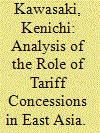

|
|
|
|
|
| Summary/Abstract |
While many studies focus on the impact of trade agreements, the literature has not focused on the extent of their implementation, in terms of the aspects agreed upon therein. In this article, we identify the past achievements of economic partnership agreements (EPAs) in the East Asian region in terms of tariff removals and suggest room for further economic benefits from trade liberalisation in the region. Second, we incorporate the HS6-level tariff concession dataset, which distinguishes between tariff removals agreed in these EPAs in East Asia but not yet implemented, from existing overall tariffs in 2011, in the Global Trade Analysis Project (GTAP) Database, which only incorporates enforced tariff reductions through the base-year applied tariffs. To analyse future trade integration, we include commitments that are not yet implemented. This allows us to analyse partial versus full enforcement of tariff concession commitments. Our results suggest that taking those commitments into account matters economically in East Asia.
|
|
|
|
|
|
|
|
|
|
|
|
|
|
|
|
| 2 |
ID:
090602
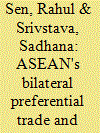

|
|
|
|
|
| Publication |
2009.
|
| Summary/Abstract |
The phenomenon of proliferation of preferential trade agreements, bilaterally and regionally, was particularly more pronounced both in the aftermath of the regional financial and economic crisis that affected East Asia in 1997-98 and in the inability of the WTO to yield any substantial outcome to improve growth prospects of the Asian economies. This paper analyses the implications of ASEAN's ongoing FTAs and examines its role in fostering deeper economic integration within ASEAN and in Asia. It analyses the evolution and characteristics of FTA proliferation in ASEAN, identifying major trends. The paper argues that in their present state, if not properly designed and managed, there are valid concerns that these FTAs could end up becoming a stumbling block towards integration efforts. Implementation integrity among FTA members therefore remains a key to its success, and empirical and policy research needs to be much more forthcoming in this area in order to fully understand the economic ramifications of these FTAs.
|
|
|
|
|
|
|
|
|
|
|
|
|
|
|
|
| 3 |
ID:
126866
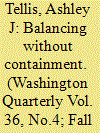

|
|
|
| 4 |
ID:
121221
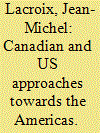

|
|
|
|
|
| Publication |
2012.
|
| Summary/Abstract |
The purpose of this article1
is to envisage the evolution of the relations
between Canada and the United States with their southern neighbours,
with the objective of comparing the respective attitudes of the two North
American partners vis-à-vis Latin America. Under the administration
of George W. Bush, anti-Americanism intensi?ed worldwide. Nothing
comparable occurred in the case of Canada: as a middle power with a legacy
of peacekeeping initiatives in its recent past, it naturally came to be perceived
in a more positive way. This difference led many to wonder whether Canada
might be contemplated, in the Americas as elsewhere, as representing
somehow a "more acceptable" version of the US. Or at least it did so until
the past few years, during which time it has been said that the elections of
Stephen Harper in 2006 and of Barack Obama in 2008 have brought about
a shift in the two countries' "images." This article seeks to test this claim,
with special reference to the relations of each with Latin America.
|
|
|
|
|
|
|
|
|
|
|
|
|
|
|
|
| 5 |
ID:
179230
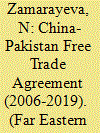

|
|
|
|
|
| Summary/Abstract |
This article deals with the current regional, bilateral and domestic challenges in preparation for and implementation of basic stages of the China-Pakistan Free Trade Agreement (FTA) which has been an integral part of the Chinese One Belt, One Road global project (OBOR), or the Belt and Road Initiative (BRI).
|
|
|
|
|
|
|
|
|
|
|
|
|
|
|
|
| 6 |
ID:
078849
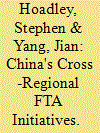

|
|
|
|
|
| Publication |
2007.
|
| Summary/Abstract |
This article surveys the recent initiation of free trade talks by China. Of particular interest are the motives driving this innovation, particularly as regards negotiations with distant rather than regional partners, known as cross-regional trade agreements or CRTAs. This investigation is guided by the conceptual analysis presented by Solís and Katada in this issue of Pacific Affairs.
The authors find that the initiation of cross-regional preferential trading links allows the Chinese leadership to speed up economic development, to hedge against future trade diversion in other regions of the world, to pursue domestic reform at their own chosen pace, to develop negotiating expertise in a less tense political environment, and to advance core interests in foreign economic policy and security policy by validating the concept of a peaceful rise to power. China's recent pursuit of cross-regional FTAs is thus significant not only for the economic benefits they promise but also for their enhancement of China's national power and capacity for international leadership without provoking conflict. As a supplement to China's diplomacy, cross-regional FTA negotiations must be recognized as an important new element of China's long-term international strategy
|
|
|
|
|
|
|
|
|
|
|
|
|
|
|
|
| 7 |
ID:
086422
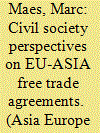

|
|
|
|
|
| Publication |
2009.
|
| Summary/Abstract |
This paper focuses on the positions taken by civil society organisations that actively campaign on trade policies. Trade campaigners oppose the neo-liberal approach to trade and development and advocate a much more gradual and prudent approach to trade liberalisation. They stress that trade liberalisation will only lead to sustainable development if it respects environmental and social concerns, including the gender dimension of trade; if trade liberalisation is properly owned, prepared and sequenced; adapted to the institutional and economic needs and capacities of the countries and people involved, and accompanied by all necessary flanking measures. Trade campaigners stress the need to maintain policy space and the necessary governance instruments to react to changing circumstances and address social and environmental concerns. They denounce the lack of information, consultation and participation provided by governments in trade policy formulation and negotiations and they campaign to raise awareness and create more room for debate and participation.
This article builds on a paper presented on 19-20 June 2008 at an UNU-CRIS Work Shop in Bruges on "Deep Integration and North-South Free Trade Agreements. EU Strategy for a Global Economy".
|
|
|
|
|
|
|
|
|
|
|
|
|
|
|
|
| 8 |
ID:
161558


|
|
|
|
|
| Summary/Abstract |
Despite the emergence of a rich literature on the rise of China in Latin America (LAC) since 2000, we are still grappling with this phenomenon. In this article we seek to theorize this expanding South–South relationship from two vantage points. First, from the perspective of China, we argue that, by necessity, the PRC has had to internationalize its development strategy in order to compensate for its serious natural resource deficit, feed the world's largest domestic population, and fuel the soon-to-be largest economy in the world. LAC has been just one slice of China's ‘go out’ strategy. Our second perspective probes the effect of China's entry into the region. Through the lens of development economics, we identify three separate political economy scenarios that have been accentuated within those countries that have the strongest economic ties with China. We rely on measures of institutional performance and macro-economic trends to illustrate the variable effects of China on LAC.
|
|
|
|
|
|
|
|
|
|
|
|
|
|
|
|
| 9 |
ID:
057531
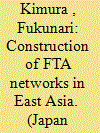

|
|
|
| 10 |
ID:
121779
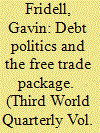

|
|
|
|
|
| Publication |
2013.
|
| Summary/Abstract |
While much has been written on how powerful institutions have used debt crises to foist free trade agreements on poorer states, this paper explores how the foisting of free trade agreements on poorer states has resulted in debt crises. Part one critiques the common-sense understanding of 'free trade' as a mere technical or policy issue, arguing that it is an intricate political, economic and ideological 'package' rooted in complex social, historical and cultural forces. Part two explores the role of debt in the free trade package by examining the impact of free trade agreements on the Caribbean over the past decade, during which time the region has experienced growing public and personal debt crises, further fuelled by an aid packages that included millions of dollars of concessional loans. It is argued that the contradictions of 'free trade' are mitigated through a 'debt for trade' paradigm, which Caribbean states are beginning to subvert through new preferential South-South partnerships.
|
|
|
|
|
|
|
|
|
|
|
|
|
|
|
|
| 11 |
ID:
083672
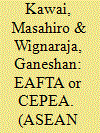

|
|
|
|
|
| Publication |
2008.
|
| Summary/Abstract |
The spread of free trade agreements (FTAs) in East Asia amidst slow progress in the WTO Doha negotiations has stimulated a debate over the way forward. This paper examines the region's evolving trade architecture, characteristics of FTAs and welfare implications of alternative FTA scenarios. It suggests that consolidation of multiple and overlapping FTAs into a single East Asian FTA can help mitigate the harmful noodle bowl effects of different tariffs, rules of origin and standards. The paper also suggests that WTO-plus elements need to be further expanded and that consolidation into a Comprehensive Economic Partnership in East Asia at the ASEAN+6 level would yield the largest gains to East Asia among plausible regional trade agreements. As the next priority, the paper points to the formation of FTAs between East Asia, the United States and the EU as well as making FTAs more multilateral-friendly.
|
|
|
|
|
|
|
|
|
|
|
|
|
|
|
|
| 12 |
ID:
099892
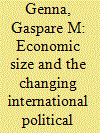

|
|
|
|
|
| Publication |
2010.
|
| Summary/Abstract |
Why are some free trade agreements (FTAs) in the western hemisphere successfully negotiated and implemented while others seem to stagnate during negotiations? FTAs are more likely to develop when there is an asymmetrical power relationship and potential partners are satisfied with projected trade patterns. The European Union (EU) and United States have been successful in negotiating agreements with the Caribbean and Central American (CCA) countries. However, current bilateral and multilateral trade talks between the EU, the Common Market of the South (MERCOSUR), and United States are at a standstill. Although all four sets of trade negotiations include dissatisfactory conditions for the Latin American countries, the two negotiations with the CCA countries were successful completed, but the two involving MERCOSUR countries have not. These results are partially due to two factors: the economic size differential between the CCA countries and MERCOSUR vis-à-vis the EU and United States, and MERCOSUR's growing economic ties with China. MERCOSUR's medium-size economy and ties with China allows it to forgo FTAs with the EU and United States until more favorable conditions are met. However the CCA countries' immensely smaller size and economic ties with China do not allow for such abstention.
|
|
|
|
|
|
|
|
|
|
|
|
|
|
|
|
| 13 |
ID:
189457
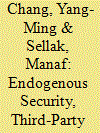

|
|
|
|
|
| Summary/Abstract |
This paper examines third-party trade and its implications for conflicts between hostile countries not engaging in trade. We present a conflict-theoretic model to analyze two adversaries’ endogenous arming decisions when they separately establish a free trade agreement (FTA) with a neutral third-party state. We contrast this multiple FTAs regime with a single FTA regime between one adversary and the third-party state, which excludes the other adversary as a non-member. In our analysis, the benchmark case is a protectionist regime when the bilateral trade between the third-party state and each of the adversaries is a tariff war. Among the three trade regimes, we show that the two adversaries’ aggregate arming is the lowest under multiple FTAs but is the highest under a single FTA. These results suggest that, despite no trade between two adversary countries, multiple FTAs through third-party trade have the pacifying or appeasing effect of lowering overall military buildups in interstate conflicts.
|
|
|
|
|
|
|
|
|
|
|
|
|
|
|
|
| 14 |
ID:
085713
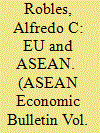

|
|
|
|
|
| Summary/Abstract |
In May 2007, the EU and ASEAN agreed to launch negotiations for an FTA. In entering the negotiation process, it is obvious that the EU has learned lessons from its failed negotiations with Mercosur. Thus the EU sought to ensure that there was a consensual basis for the (positive) assessment of an FTA's consequences, and it insisted on setting a deadline for the negotiations. ASEAN has to learn two lessons from the EU-Mercosur experience. First, there is a difference between the EU's rhetoric and the reality of the negotiations. Second, there is a wide gap between the possible negative consequences of FTA and the assistance that the EU may offer to enable countries, firms and workers to cope with these consequences.
|
|
|
|
|
|
|
|
|
|
|
|
|
|
|
|
| 15 |
ID:
086406
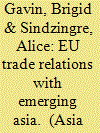

|
|
|
|
|
| Publication |
2009.
|
| Summary/Abstract |
Trade interdependence between Europe and Asia has rapidly increased in recent years. Europe-Asia trade flows now constitute a 'third link' in the global economy. As trade expands, however, global trade governance has declined and free trade agreements (FTAs) have increased. Hence, the Global Europe strategy has been designed to enhance trade relations with emerging Asia which is the most dynamic region in the global economy today. But Asia's model of export led growth leaves it more exposed to shocks emanating from outside the region than ever before raising questions about its sustainability. Deep integration agreements between Europe and Asia are needed to foster economic growth. They also need a development dimension to help Asian countries address their key development challenges.
Brigid Gavin was the Research Coordinator of the workshop on 'Deep Integration and North-South Free Trade Agreements: EU Strategy for a Global Economy' which provided the papers and discussion forum for the articles in this special edition. The workshop took place at the United Nations University-Comparative Regional Integration Studies (UNU-CRIS) centre in Bruges, Belgium on 19-20 June, 2008. She wishes to express her thanks to Mr Luk Van Langenhove, Director of UNU-CRIS for financial support and to all the authors and participants in the workshop for their contribution to making this project a real success. A special word of thanks goes to Lars Nilsson, Chief Economist Unit, DG Trade, European Commission for his opening presentation to the workshop.
Alice Sindzingre is Research Fellow, National Centre for Scientific Research (CNRS), University of Paris and Visiting Lecturer at School of Oriental and African Studies (SOAS), University of London. This analysis draws from her paper 'The EU Economic Partnership Agreements with Africa' which she presented at the workshop and available on the UNU-CRIS website.
|
|
|
|
|
|
|
|
|
|
|
|
|
|
|
|
| 16 |
ID:
144983
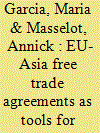

|
|
|
|
|
| Summary/Abstract |
Article 21 of the Treaty of Lisbon mandates the European Union (EU) to foster its values (democracy, the rule of law, social rights, gender equality, etc.) in its external relations. The core concern of the EU’s multi-faceted relations with Asia is economic relations with rising markets. EU relations with the region have focused on the facilitation of trade and investment through the negotiation of free trade agreements (FTAs) with a number of Asian partners. EU FTAs are accompanied by a Political Cooperation Agreement (PCA), which links core EU values to trade through the ‘standard clause’, whereby under certain circumstances, human rights’ abuses can trigger a suspension of trade preferences. Using a qualitative case study methodology, and drawing on policy documents and interviews, this paper addresses the question of whether, and how, the EU can balance its internal legal obligations with its economic interests and its partners’ demands. The article provides a legal background of the EU’s obligations in terms of international value promotion. It then reviews EU trade policy strategies and reveals an absence of a concerted approach to the inclusion of values. The article investigates the sources of resistance to EU attempts at linking its trade policy with broader values including social rights with Asian partners. The analysis reveals that Asian resistance is centred on the legalistic approach of the EU rather than the values and suggests that a more effective norm export might be achieved through other means. The article concludes that the EU’s failure to push forward social issues in FTAs ultimately casts serious doubts about the EU’s international ‘actorness’ in the area of social rights.
|
|
|
|
|
|
|
|
|
|
|
|
|
|
|
|
| 17 |
ID:
155753
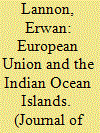

|
|
|
|
|
| Summary/Abstract |
The aim of this paper is to analyze, from a geostrategic, geo-economical and cooperation perspective, the relationships established by the European Union with the Indian Ocean Islands: Comoros, Madagascar, Maldives, Mauritius, Seychelles and Sri Lanka. The analysis also takes into consideration the cases of Mayotte, La Réunion, the Scattered Islands and the Chagos Archipelago. At strategic level, the EU has developed its actions in the Indian Ocean since the launching of the naval operation EU NAVFOR-ATALANTA in 2008, in response to the rising levels of piracy in the region. At geo-economic level, the implementation of the interim Economic Partnership Agreement with Madagascar, Mauritius, the Seychelles, and Zimbabwe is a major step, but other (potential) trade agreements, notably with Indonesia and India, have to be taken into consideration. At cooperation level, different EU’s (sub-)regional and bilateral actions are analyzed, including new specific programs and projects combining external and internal financial instruments in the region. The analysis of this complex network of relationships is the basis for identifying opportunities for developing a more ambitious and comprehensive strategy of the European Union vis-à-vis the Indian Ocean islands.
|
|
|
|
|
|
|
|
|
|
|
|
|
|
|
|
| 18 |
ID:
155490
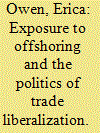

|
|
|
|
|
| Summary/Abstract |
The movement of jobs overseas—known as “offshoring”—is one of the most politically charged aspects of globalization in developed countries. The high salience of offshoring reflects growth in competitive pressures from globalization that directly target individuals’ jobs. I argue that, in a world of fragmented production, how vulnerable one’s occupation is to offshoring helps explain patterns of protectionist sentiment not otherwise accounted for by existing work. I expect that the negative consequences of offshoring for workers will be particularly salient. As a result, vulnerability to offshoring is likely to generate protectionist sentiment toward free trade among constituents. Therefore, legislators whose constituents are vulnerable to offshoring should prove more likely to oppose trade liberalization. I measure vulnerability to offshoring at the district level using data from the US Census. I analyze roll call votes on free trade in the House of Representatives between 2001 and 2006. I find that the larger the share of their constituents who are vulnerable to offshoring, the more likely legislators are to vote against free trade and to discuss the costs of trade for workers in floor debates. My results suggest that the dynamics of offshoring constitute an overlooked dimension to the political economy of trade.
|
|
|
|
|
|
|
|
|
|
|
|
|
|
|
|
| 19 |
ID:
086429
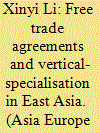

|
|
|
|
|
| Publication |
2009.
|
| Summary/Abstract |
Regional integration in East Asia has been described as 'market-led' integration driven by the activities of multinational corporations creating vertical specialisation. This paper investigates the effect of free trade agreements (FTAs) on vertical specialisation-based trade by employing a gravity estimation for a sample of nine East Asian countries plus the US. We find that FTAs promote international trade based on vertical specialisation and enhances deep integration between countries. The FTA effect on vertical specialisation-based trade increases with pre-agreement vertical linkage level, that is, the deeper the real integration between countries the larger the FTA impact. The results of this paper also suggest that deeper economic integrations, such as currency unions, will enhance trade based on vertical production by reducing the risk of exchange rate volatility.
|
|
|
|
|
|
|
|
|
|
|
|
|
|
|
|
| 20 |
ID:
124902
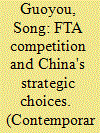

|
|
|
|
|
| Publication |
2013.
|
| Summary/Abstract |
Competition over setting up free trade agreements (FTAs) first began to heat up after the outbreak of the 2008 global financial crisis. FTAs started by developed countries are converging and China has been frustrated by exclusion. All this indicates that the developed economies are focusing on achieving their strategic goals: that is to reform trade relations, reset the game rules and redeploy economic interests. China must take appropriate measures and maintain a global multilateral trade framework.
|
|
|
|
|
|
|
|
|
|
|
|
|
|
|
|
|
|
|
|
|